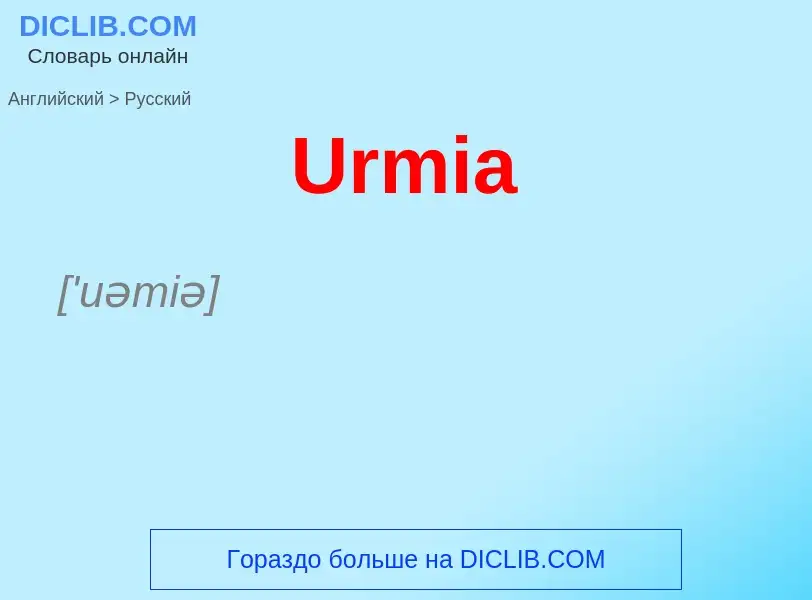Μετάφραση και ανάλυση λέξεων από την τεχνητή νοημοσύνη ChatGPT
Σε αυτήν τη σελίδα μπορείτε να λάβετε μια λεπτομερή ανάλυση μιας λέξης ή μιας φράσης, η οποία δημιουργήθηκε χρησιμοποιώντας το ChatGPT, την καλύτερη τεχνολογία τεχνητής νοημοσύνης μέχρι σήμερα:
- πώς χρησιμοποιείται η λέξη
- συχνότητα χρήσης
- χρησιμοποιείται πιο συχνά στον προφορικό ή γραπτό λόγο
- επιλογές μετάφρασης λέξεων
- παραδείγματα χρήσης (πολλές φράσεις με μετάφραση)
- ετυμολογία
Urmia - translation to ρωσικά
['uəmiə]
Βικιπαίδεια

Urmia or Orumiyeh (Persian: ارومیه, pronounced [oɾumiˈje] (listen)) is the largest city in West Azerbaijan Province of Iran and the capital of Urmia County. It is situated at an altitude of 1,330 metres (4,360 ft) above sea level, and is located along the Shahar River on the Urmia Plain. Lake Urmia, one of the world's largest salt lakes, lies to the east of the city, and the border area with Turkey lies to the west.
Urmia is the 10th-most populous city in Iran. At the 2006 census, its population was 577,307 in 153,570 households. The following census in 2011 counted 667,499 people in 197,749 households. The latest census in 2016 showed a population of 736,224 people in 225,050 households. The majority of the city's residents are Azerbaijanis, with a large minority of Kurds, and a smaller number of Assyrians, and Armenians, as well as Persian-speakers who moved to the city mostly for employment.
The city is the trading center for a fertile agricultural region where fruits (especially apples and grapes) and tobacco are grown. Even though the majority of the residents of Urmia are Muslims, the Christian history of Urmia is well preserved and is especially evident in the city's many churches and cathedrals.
An important town by the 9th century, the city has had a diverse population which has at times included Muslims (Shias and Sunnis), Christians (Catholics, Protestants, Nestorians, and Orthodox), Jews, Baháʼís and Sufis. Around 1900, Christians made up more than 40% of the city's population; however, in the next decades, most of the Christians were either killed as a part of the advancing Ottoman troops and raids by Kurdish tribes or fled shortly after the end of the war.




![[[Assyrian Evangelical Church]] in Urmia. [[Assyrian Evangelical Church]] in Urmia.](https://commons.wikimedia.org/wiki/Special:FilePath/Assyrian Evangelical Church in Urmia.jpg?width=200)
![Assyrian]] church located in the city of Urmia. Assyrian]] church located in the city of Urmia.](https://commons.wikimedia.org/wiki/Special:FilePath/Church of Saint Mary - Urmia - Iran - کلیسای ننه مریم، ارومیه - ایران.jpg?width=200)





![[[Safi al-Din al-Urmawi]], was a renowned musician and writer on the theory of music. [[Safi al-Din al-Urmawi]], was a renowned musician and writer on the theory of music.](https://commons.wikimedia.org/wiki/Special:FilePath/Safiyeedin Urmavi.jpg?width=200)
![[[Haydar Khan e Amo-oghli]], was a leftist revolutionary during the Iranian Constitutional Revolution and among the founders of the Communist Party of Iran. [[Haydar Khan e Amo-oghli]], was a leftist revolutionary during the Iranian Constitutional Revolution and among the founders of the Communist Party of Iran.](https://commons.wikimedia.org/wiki/Special:FilePath/Amo-oghli.jpg?width=200)
![[[Fatma Mukhtarova]], was a Soviet opera singer. [[Fatma Mukhtarova]], was a Soviet opera singer.](https://commons.wikimedia.org/wiki/Special:FilePath/Fatma Mukhtarova.jpg?width=200)
![[[Abdul Rahman Ghassemlou]], Iranian Kurdish politician, was born in Urmia. [[Abdul Rahman Ghassemlou]], Iranian Kurdish politician, was born in Urmia.](https://commons.wikimedia.org/wiki/Special:FilePath/Rahman ghasemlu.jpg?width=200)
![Iranian national team]] which he captains. Iranian national team]] which he captains.](https://commons.wikimedia.org/wiki/Special:FilePath/Saeid Marouf IRN WC 2014.jpg?width=200)
![[[Mehrsa Baradaran]], an American law professor at the [[University of California, Irvine]], was born in Urmia [[Mehrsa Baradaran]], an American law professor at the [[University of California, Irvine]], was born in Urmia](https://commons.wikimedia.org/wiki/Special:FilePath/Picture Mehrsa Baradaran.jpg?width=200)
![[[Davood Azad]], is an Iranian classical and folk music singer. [[Davood Azad]], is an Iranian classical and folk music singer.](https://commons.wikimedia.org/wiki/Special:FilePath/داوود آزاد- Davood Azad.jpg?width=200)






